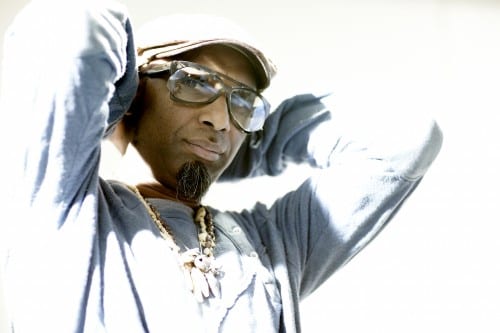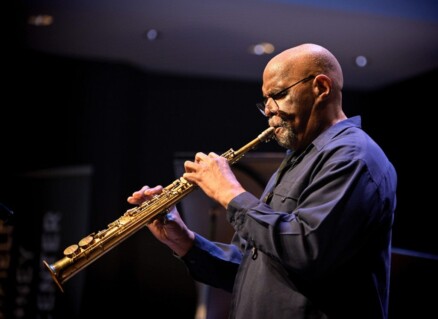Interview | Omar Sosa discusses putting a personal spin on Miles Davis’ landmark record, Kind of Blue


by Giovanni Russonello
Editorial board
The Cuban pianist Omar Sosa’s latest album is called Eggún, or “spirit of the ancestors” in the Yoruba/Santería spiritual tradition that Sosa celebrates, and it pays tribute to Miles Davis’ Kind of Blue. Like so many, the project started with a grant. But Sosa was hesitant to embrace a commission to readdress the legacy of jazz’s major masterwork. Then he thought, if he could do it his way, he would.
The five slow-burning, vamp-heavy tunes on Kind of Blue helped introduced Indian improvisational ideas and open-faced, one-chord structures to jazz. Sosa could have just put these songs into a modern Afro-Cuban context; his own aesthetic of punctuated Latin groove has broad enough shoulders to carry them in a personal way.
But on Eggún he pulls inspiration from Davis’ later electric work, and he’s decided not to treat the tunes directly; instead he’s working principally with the long and wandering solos that define Kind of Blue, and seem to swim in and out of each other over the band’s sturdy swing. By plucking out individual moments from some of those solos – by the likes of Davis, Cannonball Adderley, John Coltrane and Bill Evans – Sosa found the threads that would become the themes on his album.
The result is a potent record with the smooth dynamism of a dancer’s step. Sosa arrives in the area on Friday evening to perform with most members of the ensemble that recorded Eggún. He and I caught up last week to discuss his love for Davis’ music, and how he put his own stamp on it.
CapitalBop: Did you feel like the best way to carry forth Miles’ legacy is to do something original?
Omar Sosa: Everybody has their own way to look at the picture, but the way I look at it is, “Kind of Blue is already a masterpiece. What can I do with the music of Kind of Blue?” Being a Cuban musician, of course I can give it a Latin flavor, but when the Barcelona Jazz Festival first asked me to play something around Kind of Blue I said no. I used to listen to this record a lot. I love this record.
Then after I thought a bit more about the idea, and started to watch more Miles videos and read Ashley Kahn’s Kind of Blue book, I remember in one interview of Miles in Paris, he said: “Be yourself.” This triggered me to say, “Okay, I’m going to be myself inside your music.” That was the beginning of the project. I started to transcribe all the solos in every song [on the album]. And then I’d take a little fragment of each solo in each song and glue them together.
Sometimes I’d take a part from one solo of Miles’, and part of another solo from another song and glue them together, and actually create a melody…. It was a lot of work; it took seven or eight months to write the music. But then when I finished I was happy with the result. Because what I took was the spirit of the record; I kept the timing of the songs….
The idea was to present new music based in music people know already. But the idea was, don’t present it in the traditional way where you take the melody and maybe change the melody a little or [vise versa]. No we keep the spirit and the [beats per minute], the timing, of the song…. I like that it’s modal, because I love African music—that’s my life. And most African music is modal music. So I tried to recreate the spirit I get from Kind of Blue, and I used African rhythms and concepts. For example, Childo Tomas from Maputo, Mozambique, when I called him I said, “I have this project and I want your African touch,” he said, “I’m there.”
We had fun recording the record and now we’re going to have fun playing it live. I think it’s the first time in my whole career that I’m getting to tour with the same band that recorded the record. A lot of the time the musicians are not available.
CB: You have a background in the religion of Santería/Yoruba. Eggún are spirits. How did you apply your Cuban cultural heritage to this project? Is the title a reference to Miles’ role as an ancestor in Black music and culture?
OS: Yes, I am santero, 100 percent. Most of the time when you do a tribute to one of the legends – Miles, [Thelonious] Monk, Bill Evans, Dizzy Gillespie – sometimes you put the name of the person. So when I started writing the music, I said, “What can we call the record, without saying ‘Miles Davis,’ but saying thank you to Miles?” And not only to Miles—to Trane, to Adderley. And not only to the musicians playing on the record, because when I think to Joe Zawinul, Thelonious Monk, Don Pullen, they’re always the light that guides me.
The electric experience is coming from Marque Gilmore, the drummer. He said, “Omar, why don’t we call this band the electric band?” And we decided to call it Eggún: The Afri-Lectric Experience…. Miles was into the electronics in his later period – and actually he was the first one to introduce electronics to the jazz world, with Bitches Brew. I have to say thank you to the Barcelona Jazz Festival because they pulled me out of my regular way of writing.
CB: How did you decide on the band members to include here?
OS: We worked together for a long time, in different ensembles. I have my quartet, and I work with the bass player, Childo Tomas. Now it’s gonna be 14 years that we’ve worked together, a long time. And with Marque Gilmore, we’ve worked together for almost 10 years.
The alto player, Leandro Saint-Hill, from Camgüey, Cuba, my hometown, we’ve worked together for almost six years. Peter [Apfelbaum], one of the musicians I really love, I met when I arrived in San Francisco. He was one of the first musicians I met, and I fell in love with his way of playing. It was 1995, and when I listened to his band I said, “This is the kind of music I want to play.” … The trumpet player, Joo Kraus—a friend of mine gave me one of his records, and I fell in love with his harmony, and his tone on the trumpet. I called him and asked him if he wanted to play…. For the percussion, I called John Santos because he’s a longtime friend and one of my heroes, really. And Pedrito Martinez is excellent at the Afro-Cuban drums.
Marvin Sewell, I didn’t know him, but I listened to one album of Cassandra Wilson’s, and I fell in love with the guitar player. I called my friend and I said, “Who’s this guitar player? I want to play with him.” So we found his number, and I called him up…..
Gustavo Ovalles, he plays Afro-Cuban percussion. He and I are long friends. We have a record together in duo, he used to be part of my band years ago. In a way it’s a family.
CB: And who will we be hearing at Bethesda Blues and Jazz?
OS: It’s gonna be Joo Kraus on trumpet, from Germany; Leandro Saint-Hill on alto saxophone and clarinet and flute; Peter Apfelbaum on tenor saxophone; Marque Gilmore on electronics and drums; Childo Tomas from Mozambique on electric bass and kalimba, and myself on keyboards and piano.
—
Omar Sosa’s Afri-Lectric Experience performs at 8 p.m. on Friday at Bethesda Blues & Jazz Supper Club. Tickets cost $25, plus a $10 food and drink minimum, and they can be purchased here. More information is available here.
Afro-Cuban, Afro-Cuban jazz, Bethesda, Bethesda Blues and Jazz Supper Club, DC, DC jazz, Eggun, jazz, Omar Sosa, Washington


